Whew! It’s been a long time since we blogged, but here we are! Hello World!
We presented this paper, which we wrote with our research partner Danielle Allard at the ANSWERS National Sex Workers Assembly in May 2023 in Edmonton, Canada. Danielle had emergency dental surgery and couldn’t present with us on the day, but we’re including her voice here because she wrote the presentation with us, and because she’s integral to our ongoing work on the project we discuss in this presentation.
For this blog post, we’ve provided our speaking notes with our separate voices delineated. As in our previous posts on this blog, the different perspectives and voices associated with our work are key.
*We began by showing this title slide and thanking the Indigenous peoples on whose lands we were meeting, and on whose lands we live.
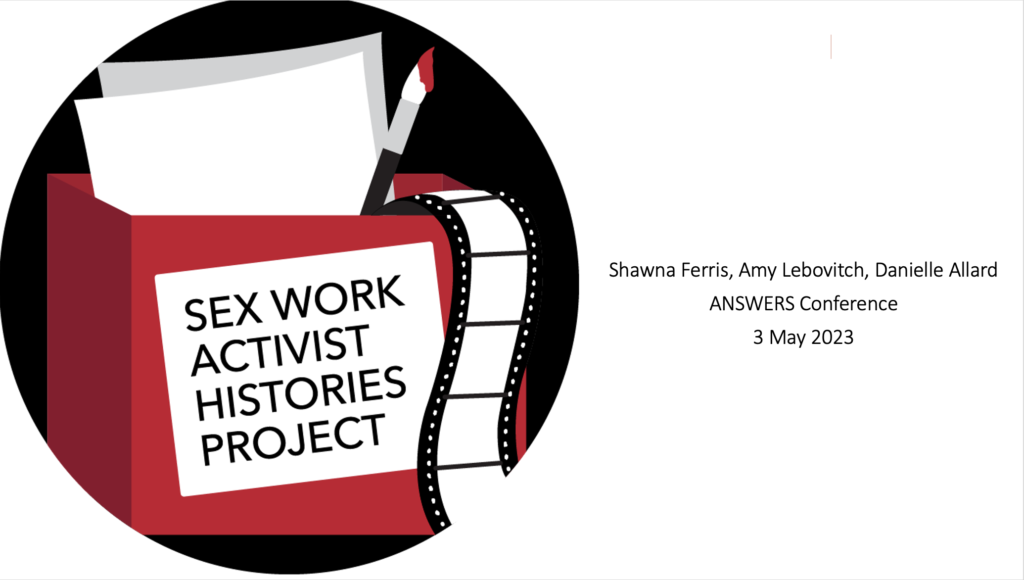
SHAWNA
We acknowledge that we speak to you today on lands governed by longstanding treaty relationships. It is our honour to be here in Treaty 6 territory the meeting ground and home for Metis and many Indigenous Peoples, including Cree, Saulteaux, Blackfoot, and Nakota Sioux.
Amy and I are visiting from Winnipeg, or Treaty 1 territory, which are the lands of the Anishnaabeg, Cree, Oji-Cree, Dakota, and Dene peoples. Treaty 1 is also part of the homeland of the Metis nation. We acknowledge not only our status as settlers and thus visitors to this land, but also the requirement that we take responsibility for the past, honour treaties, acknowledge ongoing colonial violence, do everything that we can to dismantle colonial systems and to decolonize ourselves, so that we can all move forward in a good way.
*Then Danielle said some things that offered an overview of our project and why we do it.
DANIELLE
As you all already know as sex workers and activists, one of the ongoing crises in sex work activism is the loss of records, and the stories that those records tell us, from those activists who came before us, as well as those who are active today. Until recently the histories of these radical activisms have been just as marginalized as sex workers themselves. Another challenge to such recordkeeping and knowledge sharing is that the extreme violence to which sex work activists across the continent respond is also visited upon them. This violence takes knowledge holders from us. Also serious, is the reality of activist burnout in these dire contexts. As we know this audience knows all too well, veteran activists regularly step away from activism, often cutting ties completely from their activist lives in an attempt to keep whore stigma and associated violence from following them into the rest of their lives.
Currently based here in Canada, the Sex Work Activist Histories Project (SWAHP) is an initiative to record and disseminate the radical knowledges, activist expertise, and alternative histories created by sex work activists. Bringing together the expertise of activists and researchers, SWAHP is collaborating to create, analyse, and share the rich knowledges of sex work activists. These knowledges are about, for example, community building and support; engagement in anti-violence, anti-colonial, and social justice activism generally; and engagement in sex work activism and decriminalization particularly.
SWAHP’s past and ongoing efforts to record and engage with these histories has resulted in the development of three major projects to date – and we are excited to see what happens as we connect with more and more activist groups! Today, we’ll talk about The Sex Work Database, Sex Work Activism in Canada, the book (the first in a series, perhaps?), and our (Hi)storytelling Project.
*Then we showed this slide with some sample SWD records while Amy said some things.

AMY
The Sex Work Database (SWD) is a digital activist archive that currently includes thousands of digitized and born digital records from sex worker activist groups across Canada. We’re currently working with software developers to create a customized platform for SWD. While the full collection is not yet public, we have collected both records and ‘buy-in’ from more than 20 activist groups. We have created software to grab and save entire websites created by these groups, should they wish it. We have travelled to work with groups to organize and digitize records they have stored in their own physical spaces, storage lockers, and in their members’ closets. The current SWAHP team and many other sex worker activists have worked to create descriptive information, or metadata for SWD, including key words, or tags that we use to organize all records. Our tags honour sex workers and sex worker activists’ language. The customized and community-generated metadata and tags make SWD very different from traditional archives like those housed in Universities and Libraries, where archivists use standardized key words and/or tags and story the records themselves, without community input. Record collection and creation for the Sex Work Database is ongoing.
*We “clicked” to this slide and talked about records!
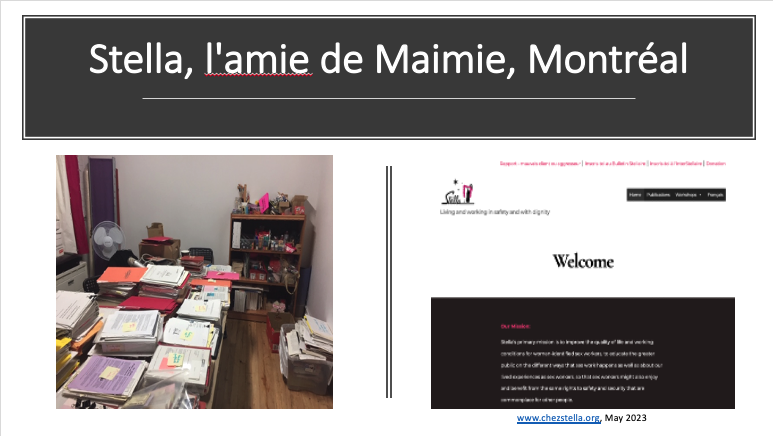
DANIELLE
This is a history project and it is fitting that we are going to tell you a little bit about our history.
In the winter of 2019 we travelled to Montreal to digitize and organize key records from Stella, l’amie de Maimie’s (then) 25-year history. We met with Stella representatives at their drop-in space and offices.
Our plan when we went was to digitize all documents that they identified as being important. This includes posters, pamphlets, annual reports, and meeting minutes. We showed up to a whole packed room of records and more that we needed to sort through to determine which ones Stella deemed to have the most archival value. This process was done together. Both archival and community expertise were required to sort through this impressive collection.
After our days of work on site at Stella’s, we had thousands of Stella records scanned, and important information about these records recorded (which is also called metadata in the world of archives). We also went back to our AirBnB with boxes of records to scan and prep off-site.
We made preliminary plans for the importing and organizing of these records in the Sex Work Database, and we recorded these decisions in a Stewardship Agreement, a document that clarifies how all records continue to belong to the organizations that create them, as well as how they will be cared for while their digital copies are in SWD. We update Stewardship Agreements as our recordkeeping and development efforts proceed with each group. We also provided Stella with an external hard-drive with their records and an accompanying spreadsheet identifying everything on the hard drive.
Some of you will probably have seen the array of beautiful promotional materials, the book, and the special issue of Stella’s magazine, Con$tellation, that they published for their 25th anniversary. Many of the images and records included in these wonderful materials came from SWAHP’s digitization work!
We also came away from our time with Stella with multiple training documents and procedures for research assistants and other team members to follow as the project unfolded.
We had an opportunity to use these lessons when we travelled to work with Amy’s home organization, the Sex Professionals of Canada (SPOC) in the summer and fall of 2019.
*Then we clicked to this slide and talked more about records and little about our book!
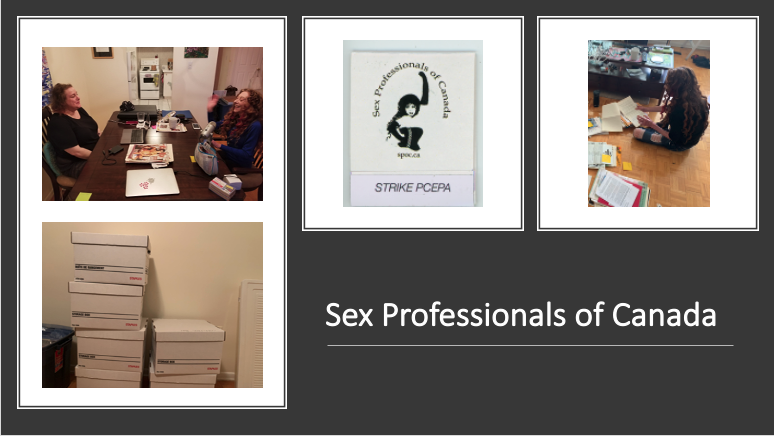
SHAWNA
SPOC, like Stella, is an older organization with decades of organizational history and boxes and boxes of associated records. As an entirely volunteer, unfunded organization, SPOC didn’t have a suite of offices in which to host us. Instead, we arranged to meet at a SPOC member’s apartment where the group had collected together their records.
While the work site differed, the archival and digitization procedures were the same: work with SPOC representatives to determine what items were to be scanned and preserved, and to develop accompanying info/metadata to go with each record. Once again, we came away with thousands of records and associated metadata, as well as boxes of items which we took home, worked on, then returned by snail mail.
What we also did for SPOC was to help create a series of short videos featuring SPOC founder and long-time spokesperson Valerie Scott. In these videos, Valerie discusses certain SPOC records and the actions or issues they represent. Valerie is a natural storyteller, and making the videos was both challenging (because the SWAHP team had to learn new skills!) and fun. We look forward to these videos being out in the world when the public version of SWD launches!
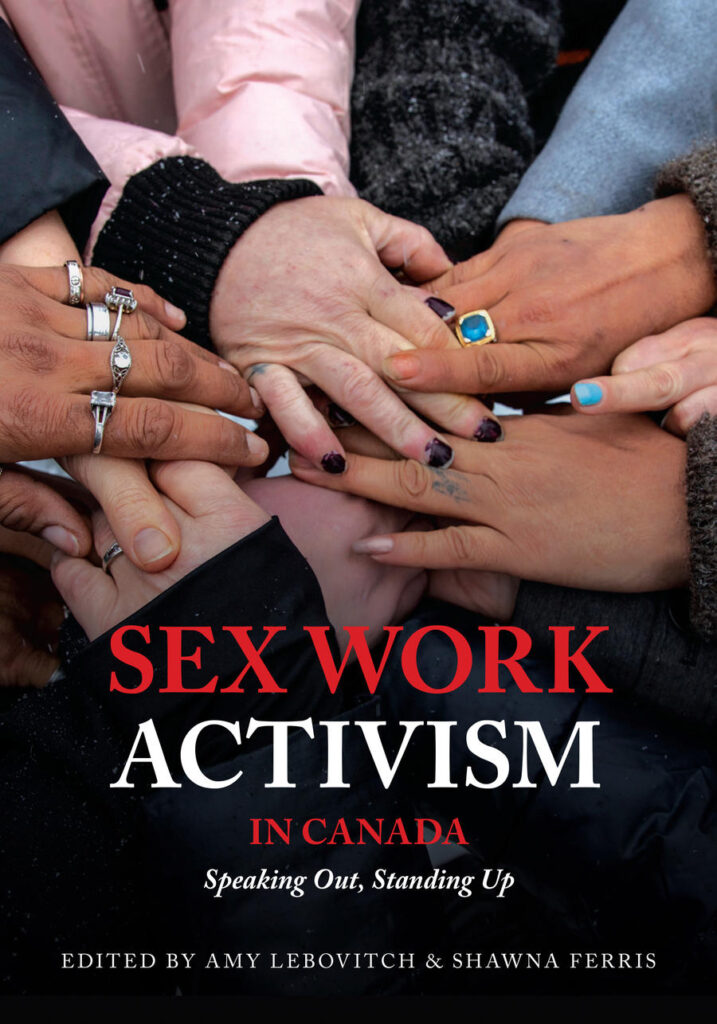
AMY
Before we travelled to organizations like Stella and SPOC to begin digitizing records, we held cross-country community consultations between 2015-2017, that lead to the development of the Sex Work Database. In these consultations, we learned that people liked the vision for SWD – sex worker activists want a searchable, organized, and as comprehensive as possible database of activist records to be shared between groups and to educate students and public visitors. But sex workers have been relegated to the internet – an inherently unstable platform – for decades now. We also learned that people wanted more permanent printed records, too.
And this is one of the many reasons that Shawna and I co-edited the book called Sex Work Activism in Canada, published by ARP Books in the Fall of 2019 (click the title, or click here to buy it). This collection includes more than 20 chapters and multiple reports that detail, discuss, and demonstrate sex worker activism undertaken across this country over the last forty years. As Shawna and I write in our introduction to this collection: “While the technology of words printed on pages to be bound together, read, and shared is an enduring form, it’s also a form that has been an elusive one for the preserving and sharing of sex worker voices.” This is maybe why the groups and individuals we approached to contribute chapters have been so positive and excited about this book.
*Next, we showed this slide and Amy talked about book launches.
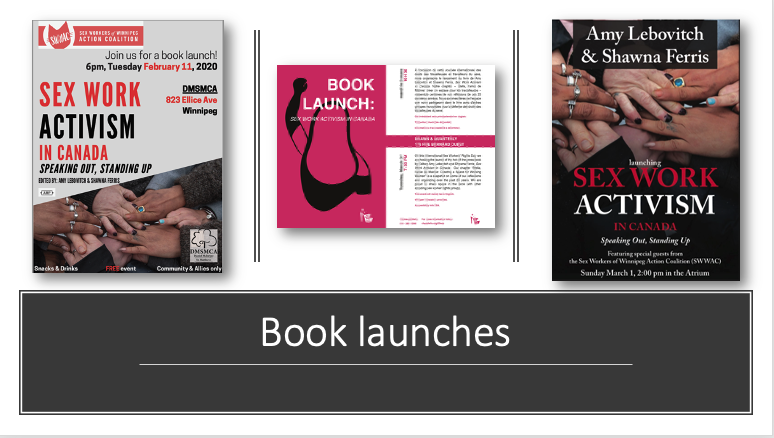
AMY
Our goal was to co-organize and host book launches with sex worker groups across the country, and to coordinate these launches with SWAHP’s trips to help groups with prep of their records. We began this process at home in Winnipeg in February 2020, where we first hosted a “Community and Allies only” launch, then a more public one at McNally Robinson Booksellers. As a result of the second launch, SWAiC was the bestselling non-fiction title at McNally Robinson for February 2020!
Shawna then travelled to Montreal to attend a launch and public panel discussion that Stella hosted at early March 2020 at independent bookseller Drawn and Quarterly. This panel included speakers from Stella as well as Projet L.U.N.E., a sex worker activist group based in Quebec City. We were very excited that the panel also included presentations from Action Santé Travesti(e)s Transexuel(le)s du Québec, and Rézo – two groups who’d been exceptionally busy and thus unable to submit chapters to the book. We agreed at this launch to re-start discussions about possibilities for other publications and recordkeeping work!
We had hoped to launch with western British Columbia-based groups the Sex Workers United Against Violence Society, the BC Coalition of Experiential Communities, Triple-X Workers’ Solidarity Association of BC, Pace Society, and Peers in spring or early summer 2020 and had just drafted emails to these groups when COVID-19 hit Canada and everything shut down.
We were, however, delighted to be invited to feature the book at Thin Air: Winnipeg International Writers Festival, an event that took place online in 2020 because of the COVID-19 pandemic.
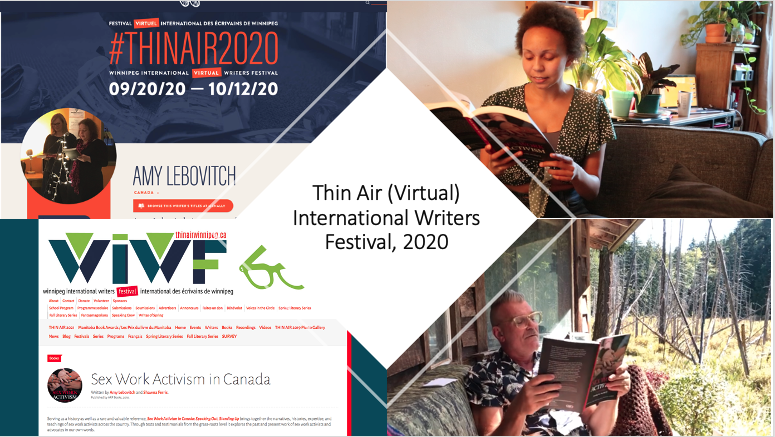
AMY
We did a combined reading at Thin Air 2020 with the fabulous Ellie Adakur (top right pic above), who presented a little from the chapter by Maggie’s Toronto, and the incomparable Andy Sorfleet (bottom right pic), who read from the Triple-X chapter.
*Then we showed this ‘thoughtful kitty in a library’ slide and Danielle said some things.
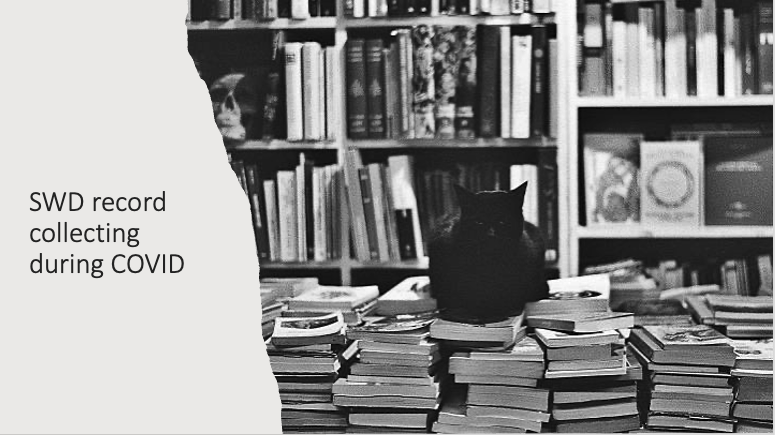
DANIELLE
We were also just solidifying plans for a trip to Victoria to begin work with Peers when COVID-19 hit.
The past three years have been exceptionally busy for so many sex worker activist groups as they struggle to support their members and communities in these very dire times. All of us struggled, too, in various ways, as the pandemic evolved.
Because of the pandemic, the university that administers our funds banned any research-related travel from Spring 2020 until very recently. We therefore had to develop remote ways of partnering to move the recordkeeping aspects of the Sex Work Activist Histories Project forward.
SWAHP & Peers:
We had met with Rachel, the previous Executive Director of Peers, in January 2020. We met with her again, by videoconference, in February 2021 and made plans to receive some of Peers’ records by snail mail. We also mailed an external hard-drive to Peers where they could save any digital files for SWD. We’ve digitized, cleaned, and prepped many of the records Peers sent to us. We’re hoping to meet with Peers representatives soon to finalize the metadata that goes with their records.
SWAHP & BCCEC:
We also met with representatives from the BC Coalition of Experiential Communities in Winter 2021 to discuss how we might collaborate with them using computers, snailmail, and the like to develop a collection for BCCEC in the Sex Work Database. We’ve begun by searching out and downloading the many reports their organization published.
SWAHP & Maggie’s Toronto:
We spoke with Maggie’s representatives when we travelled to work with SPOC in fall 2019. We hope to be able to work with them soon!
SWAHP & other groups:
We’ve reached out to groups who work with trans and male sex workers.
*Next we showed this ‘super interested kitty’ slide, and Shawna said things about one of our most recent projects.
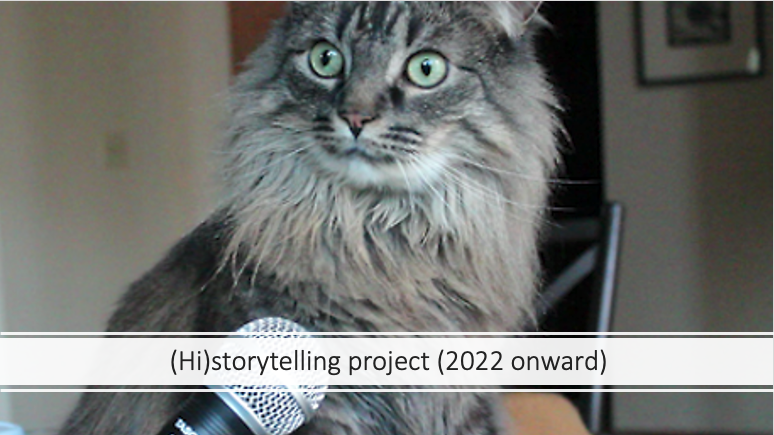
SHAWNA
One of the many things we have learned through COVID is that videoconferencing enables lots of creative and fabulous things. We recently started what we are calling a (Hi)storytelling Project in which we build on many people’s newly-developed comfort with videoconferencing, especially since COVID is still an issue for many in the contexts of travel and meeting face-to-face.
In this project, then, we collect sex worker activist histories in different ways.
When we met with sex worker groups pre-COVID, we encountered some wonderful natural storytellers who had been doing sex worker activism for a long time, and whose (hi)stories of that activism are, we think, super-important to record and share more widely. Because of the book we have already done, we know there is much interest in the kinds of stories sex worker activists have to tell.
We are reaching out as many of these natural storytellers as possible, to invite to work with us using digital technologies to record and preserve their activist stories in ways that make sense to them. One of the first of these stories will soon be available on the SWAHP website.
*Then we showed this red umbrella slide and Amy talked about SWAHP methods.
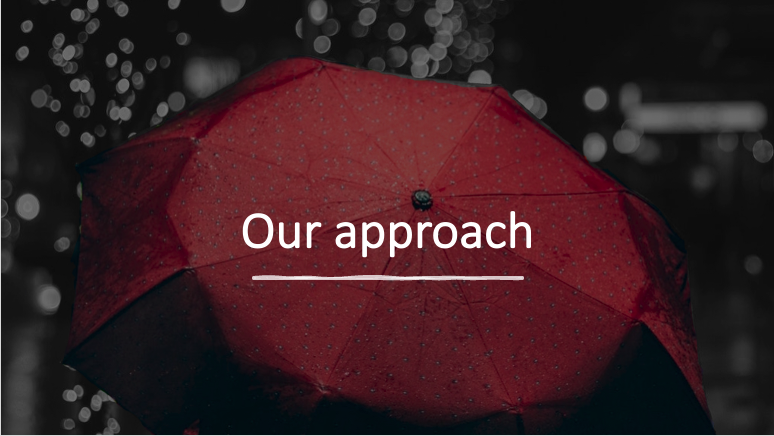
AMY
We don’t see ourselves as collecting people’s stories and using them for our own professional ends. Instead, we think of ourselves as using the power and resources of the institution of the university to support sex worker activists’ work, and then recording and sharing of our histories first and foremost among our own communities. Therefore good collaborative relationships are key. Part of maintaining good relationships is valuing people’s time – for us, as Shawna and I have talked about before on this blog, this means paying people for the work they do with us.
Good relationships also involve recognizing people’s expertise in framing and providing information about their records. We support this by working with those who donate records to develop all the information that accompanies each record.
Another important way to achieve our project’s goals is to ensure activists’ control and continuing ownership of their own records. We do this using our detailed Stewardship Agreements in which activists themselves decide what records are made public in SWD.
*Next we showed this ‘cat crew’ slide and Danielle talked about being based at a university.
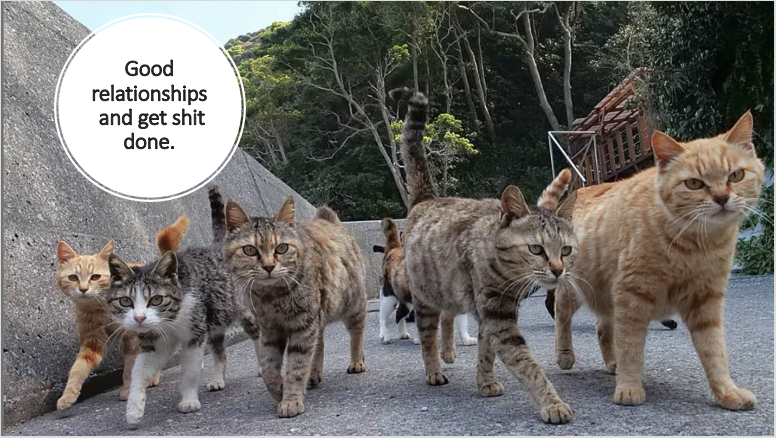
DANIELLE
If we don’t have good relationships, we have nothing. We have no mandate, no records/histories, no work.
Equally important: If we don’t get things done, we risk breaking the trust that gave us the work to do in the first place.
See? Like these kitties – don’t they look like they’re all operating together towards a common goal? That’s how cats work, right?
On the “get shit done” point: we have learned that there are benefits and drawbacks to operating from within the university.
One major benefit is access to resources. For example, SWAHP has been generously funded by grants available to us because Shawna and I are university-based researchers. We are also fortunate to be affiliated with Mamawipawin – Kiera Ladner’s Indigenous community research space that provides technological infrastructure that supports the project.
But there are also some drawbacks. Frankly, managing the university has taken up a lot more of our time and energy than we ever could have anticipated. We have learned that universities aren’t set up to support the community-based work that we do. If we imagine that Amy, Shawna, me, and our allies are the kitties pictured in this slide, I assure you that these kitties are taking on the university and all of its bureaucratic and exclusionary practices and policies. It’s exhausting, but we are making some headway, and we are persistent!
*Then we showed this slide – the only one with dogs on it – and Shawna talked about how we’re advocating for change at the university.
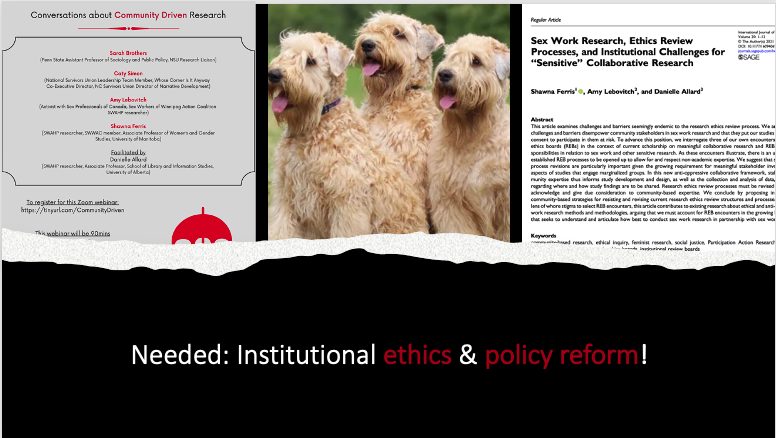
SHAWNA
Getting shit done has a lot to do with making our institutions recognize what community research actually involves, and the expertise that community researchers, i.e. those who are not academics but nonetheless do research, bring to our projects.
Ethics applications became case studies that really revealed what was happening in the institution, and just how disregarded community expertise can be.
Our responses to these exclusionary realities:
1. We wrote an Open Access (which means free, and publicly available) academic paper about it. It’s called “Sex Work Research, Ethics Review Processes, and Institutional Challenges for ‘Sensitive’ Collaborative Research,” and it’s published in the International Journal of Qualitative Methods. Read that article here.
2. I got some funding from the Centre for Professional and Applied Ethics at the University of Manitoba for Amy and I to do some ethics-oriented research and to hold and record some public roundtable discussions on community research. The first of these roundtables happened on May 16th, 2023. It was called “Conversations about Community-Driven Research”; it featured the SWAHP team alongside powerhouse organizers and researchers Caty Simon (Leadership Team Member of National Survivors Union, Co-Executive Director of Whose Corner is it Anyway, and Director of Narrative Development for NC Survivors Union), Dr. Sarah Brothers (Assist. Professor of Sociology and Public Policy at Pennsylvania State University, and National Survivors Union Research Liaison). Access that recording here [insert link].
3. I made a formal complaint, on behalf of this and another project, to the Vice President of Research at my institution. This has resulted in some hopeful developments that we will comment on at some point in the near future.
4. I worked with a small ad-hoc group of community-oriented social justice researchers and administrative folks at my institution. Over two years we managed to get university leadership on side. And so, we got a “Community Researcher” job title that enables us to hire folks more easily and to pay more appropriately for community folks’ expertise.
5. All of us on the SWAHP team are engaged in ongoing coalition building and knowledge generation across groups and individuals doing community-oriented social justice research and activism. Please watch for our new project – The Social Justice Research Project – and its accompanying web platforms. We’ll announce it here soon!
*Finally, we showed this last slide to ask our audience important questions. Amy and Shawna led the discussion.
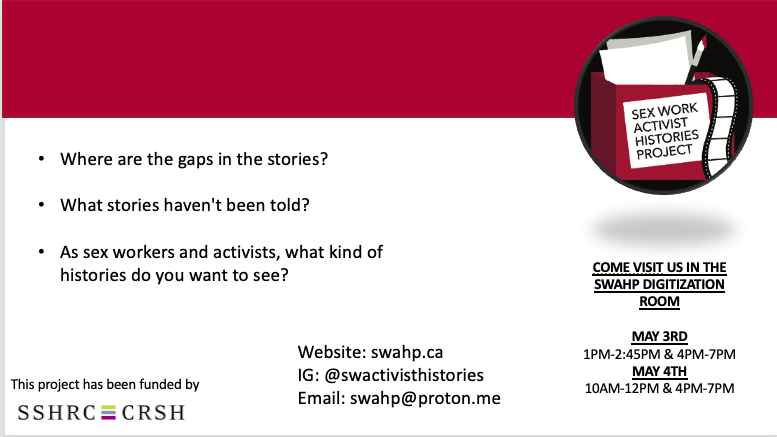
AMY
We hope very much to attach more funding to our project, and to travel, again, to do the more hands-on labour of community recordkeeping. In the interests of staying in touch and reporting on our work to date, we developed our SWAHP website and Instagram account (check us out @swactivisthistories).
We don’t yet know what the future history projects that come out of SWAHP will look like.
What we do know at this point, and what we hope we have conveyed here is that sex work activist groups have critically important activist histories to tell. The SWAHP management team on the other hand, has been accumulating skills in relationship building, digital archiving, and working in these partnerships. Together, we hope to maintain existing and build new good relationships so that we get this important shit done.
We’d love to hear from you in response to any of the questions we note here, or any other ideas you have!
THE END (but only for this paper, SWAHP continues!)